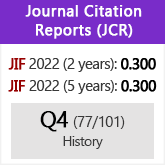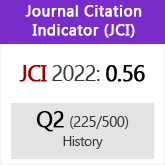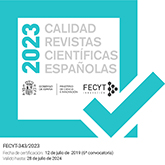Power through Language, the Language of Power: Equatoguinean Emixiles Facing Lingua Franca
DOI:
https://doi.org/10.3989/chdj.2020.014Keywords:
Identity, Equatoguinean migration, Monolingualism, Ethnotypes, Memories, DissidenceAbstract
In 1968 Equatorial Guinea became independent from Spain but inherited its cultural architecture. Current identity claims made by Equatoguinean emixiles (Ugarte’s term, 2010) are rooted in the social and territorial exclusion suffered by ethnic groups during their colonial past. In this paper I will explore the role that the Spanish language played in the identity construction of six Equatoguinean emixiles living in the city of Alicante (Spain). My interviewees’ life-stories reveal valuable information on vernacular languages, but also on the lingua franca, a tool of liberation (granting access) but also of repression. By comparing their recollections of themselves (either as Guinean or ethnic citizens) back in Guinea, to their perceptions of themselves in Spain, I intend to delve into the mutual gaze between transnational identities (Vertovec) here and there, now and then. Given Bhabha’s concept of “third space” I argue, using specific samples from my corpus, that the synchronic analysis of emixiles’ discourses within a perverse diasporic perimeter (the land of the former colonisers), needs to be completed with the diachronic view of the patterns of power which influenced postcolonial (re)construction of national/ethnic identity.
Downloads
References
Aixelà-Cabré, Yolanda (2011) Guinea Ecuatorial: ciudadanías y migraciones transnacionales en un contexto dictatorial africano. Barcelona: CEIBA.
Aixelà-Cabré, Yolanda (2017) "Exploring Euro-African pasts through an analysis of Spanish colonial practices in Africa (Morocco and Spanish Guinea)". Canadian Journal of African Studies 51 (1), pp. 23-42. https://doi.org/10.1080/00083968.2016.1276848
Álvarez Chillida, Gonzalo (2017) "Epígono de la Hispanidad. La españolización de la colonia de Guinea durante el primer franquismo". In: Michonneau, S. and Núñez-Seixas, X. M. (eds.) Imaginarios y representaciones de España durante el franquismo. Madrid: Casa de Velázquez.
Álvarez Chillida, Gonzalo and Martín Corrales, Eloy (2013) "Haciendo patria en África. España en Marruecos y en el Golfo de Guinea". In: Moreno Luzón, J, and Núñez-Seixas, X. M. (eds.) Imaginarios y Ser españoles. Imaginarios nacionalistas en el siglo XX. Barcelona: RBA, pp. 399-432.
Bayly, Christopher A. (2010) El nacimiento del mundo moderno 1780-1914. Conexiones y comparaciones globales. Madrid: Siglo XXI.
Bhabha, Homi K. (1994) The location of culture. London: Routledge.
Bolekia Boleká, Justo (2003) Aproximaciones a la historia de Guinea Ecuatorial. Salamanca: Amarú.
Bruti, Silvia; Valdeón, Roberto A. and Zanotti, Serenella (2014) "Introduction: Translating Ethnicity: Linguistic and Cultural Issues". European Journal of English Studies, 18 (3), pp. 233-241. https://doi.org/10.1080/13825577.2014.960743
Campos Serrano, Alicia (2002) De colonia a estado: Guinea Ecuatorial 1955-1968. Madrid: Centro de Estudios Políticos y Constitucionales.
Castillo-Rodríguez, Susana (2015) "The first missionary linguistics in Fernando Poo". In Zimmerman, K. and Kellemeier-Rehbein, B. (eds.) Colonialism and missionary Linguistics. Berlin, Boston: De Gruyter, pp. 76-105.
Castillo-Rodríguez, Susana (2016) "African diaspora and the circulation of language: Cuban and Afro-Cuban loanwords in Equatorial Guinea". International Journal of the Sociology of Language, 239, pp. 157-192. https://doi.org/10.1515/ijsl-2016-0008
Castillo-Rodriguez, Susana and Morgenthaler García, Laura (2016) "Exploring glottopolitical dynamics in Africa: the Spanish colonial past and beyond. An introduction". International Journal of the Sociology of Language, 239, pp. 1-28. https://doi.org/10.1515/ijsl-2016-0002
Chirila, Elena Magdalena (2015) Identidad Lingü.stica en Guinea Ecuatorial: diglosia y actitudes lingü.sticas ante el español. Ma. Thesis. Facultad de Humanidades, Departamento de Lenguas Extranjeras. Bergen University. https://bora.uib.no/boraxmlui/handle/1956/9967 [accesed 27/January/2020]
Chiyé Kessé, Adjoa Nathalie (2014) "Desde la costa africana, la invención de dos territorios: Guinea Ecuatorial y Costa de Marfil". Index.comunicación, 4 (2), pp. 101-117.
Crystal, David (2009) English as a Global Language. Language. Cambridge: Cambridge University Press.
Doorslaer, Luc van; Flynn, Peter, L. and Leersen, Joep, ed. (2015) Interconnecting Translation Studies and Imagology. Amsterdam/ Philadephia: John Benjamins.
Ferguson, Gibson (2007) "The global spread of English, scientific communication and ESP: questions of equity, access and domain loss". Ibérica 13, pp. 7-38.
Fernández Moreno, Nuria (2009) "Jefaturas y reinados Bubi durante el período colonial". In: Manso Luengo, A. (coord.) I Jornadas de Antropología de Guinea Ecuatorial. Madrid: UNED, pp. 21-56.
Iliescu Gheorghiu, Catalina and Bosaho, Rita (2018) "Equatorial Guinea: A proposal for a discourse analysis of imposed silences. Una propuesta de análisis discursivo de los silencios impuestos". In: Aixelà-Cabré, Y. (ed.) In the Footsteps of Spanish Colonialism in Morocco and Equatorial Guinea. Africanische Studien, 59. Zurich: Lit Verlag, pp. 209-235.
Jenkins, Jennifer (2018) "The future of English as a lingua franca?" In: Jenkins, J., Baker, W. and Dewey, M. (eds.) The Routledge Handbook of English as a Lingua Franca Oxford/New York: Routledge, pp 594-605. https://doi.org/10.4324/9781315717173-48
Junyent Figueras, Mari Carme (2009) "Las lenguas de África". In: Aixelà-Cabré, Y., Mallart, L. and Martí, J. (eds.) Introducción a los Estudios Africanos. Barcelona: CEIBA, pp. 149-159.
Klein, Martin (2006) "Afterword: African Participation in Colonial Rule: The Role of Clerks, Interpreters, and Other Intermediaries". In: Lawrence, B., Lynn Osborn, E. and Roberts, R. L. (eds.) Intermediaries, Interpreters, and Clerks: African Employees in the Making of Colonial Africa. Madison: University of Wisconsin Press, pp. 273-289.
Koskinen, Kaisa (2014) "Institutional translation: the art of government by translation". Perspectives: Studies in Translatology, 22 (4), pp. 479-492. https://doi.org/10.1080/0907676X.2014.948887
Lawrence, Benjamin., Osborn, Emily Lynn, and Roberts, Richard L, ed. (2006) Intermediaries, Interpreters, and Clerks: African Employees in the Making of Colonial Africa. Madison: University of Wisconsin Press.
Leerssen, Joep (2007) "Imagology: History and Method". In: Manfred Beller and Joep Leerssen, ed., Imagology: The Cultural Construction and Literary Representation of National Characters. A Critical Survey. Amsterdam/New York: Rodopi, pp. 17-32. https://doi.org/10.1163/9789004358133_003
Leerssen, Joep (2016) "Imagology: On using ethnicity to make sense of the world". Iberica 10, pp. 13-31.
Lipski, John (2000) "The Spanish of Equatorial Guinea: Research on la hispanidad's best-kept secret". Afro-Hispanic Review, 19 (1), pp. 11-38. JSTOR: https://www.jstor.org/stable/23054446
Mackenzie, Ian (2014) English as a Lingua Franca: Theorizing and teaching English. London: Routledge. https://doi.org/10.4324/9781315890081
Ndongo Bidyogo, Donato (1977) Historia y tragedia de Guinea Ecuatorial. Madrid: Editorial Cambio 16.
Negrín Fajardo, Olegario (2011) "Qué queda en Guinea Ecuatorial de la educación española? De la educación colonial a la realidad actual". Historia de la Educación 30, pp. 111-126.
Nerín, Gustau (2009) "Gonzalo de Reparaz, el africanista errante". In: Aixelà-Cabré, Y., Mallart, L. and Martí, J. (eds.) Introducción a los Estudios Africanos. Barcelona: CEIBA, pp. 15-29.
Ngah Elingui, Adeline (2014) Politiques linguistiques et multiculturalisme en République de Guinée Équatoriale, de la colonisation espagnole à nos jours. Phd. Thesis. Université François- Rabelais de Tours. École doctorale « Sciences de l'Homme et de la Societé". 28 November 2014. http://www.applis.univtours.fr/theses/2014/adeline.ngahelingui_4471.pdf [accesed 27January 2020]
Ngom Fayé, Mbaré (1999) "Introducción". In: Ndongo Bidyogo, D. and Ngom Fayé, M. (eds.) Literatura de Guinea Ecuatorial (Antología). Madrid: Sial, 11-29.
Okenve, Enrique (2009) "'Wa kobo abe, wa kobo politik': Three decades of social paralysis and political immobility in Equatorial Guinea". Afro-Hispanic Review, 28 (2), pp. 143-162. JSTOR: http://www.jstor.org/stable/41349279
Ondo Ayang, Luís; Bokesa Camó, Anacleto and Liniger-Goumaz, Max (2002) Misceláneas Guineoecuatorianas II. Nguemnismo: 33 años de auto-golpes y tortura. Corrupción nacional e internacional, Guinea Ecuatorial cultural. Geneva: Tiempos Próximos (Les Editions Du Temps).
Quilis, Antonio and Casado-Fresnillo, Celia (1995) La lengua española en Guinea Ecuatorial. Madrid: UNED.
Reithofer, Karin (2010) "English as a lingua franca vs. interpreting: battleground or peaceful coexistence?". The Interpreter's Newsletter, 15, pp. 143-157. http://hdl.handle.net/10077/4755
Sá, Ana Lúcia (2018) "The Construction of the Image of the Indígena in the Spanish Territories of the Gulf of Guinea (1904-1912)". In: Aixelà-Cabré, Y. (ed.) In the Footsteps of Spanish Colonialism in Morocco and Equatorial Guinea. Africanische Studien, 59. Zurich: Lit Verlag, pp. 101-129.
Sá, Ana Lúcia and Aixelà, Yolanda (2013) "Cultural Diversity in Africa: Colonial Legacy and Construction of Alternatives. Introduction". Nordic Journal of African Studies 22 (1&2), pp. 1-5. http://www.njas.fi/njas/article/view/163 [accesed 27 January 2020]
Saïd, Edward (1978) Orientalism. London: Routledge
Sepa Bonaba, Edmundo (2011) España en la Isla de Fernando Poo (1843-1968). Colonización y fragmentación de la sociedad. Barcelona: Ed. Icaria.
Soja, Edward (1996) Thirdspace: Journeys to Los Angeles and Other Real-and-Imagined Places. Oxford: Basil Blackwell.
Ugarte, Michael (2010) Africans in Europe. The Culture of Exile and Emigration from Equatorial Guinea to Spain. Urbana and Chicago: University of Illinois Press.
Vertovec, Steven (2009) Transnationalism. London & New York: Routledge. https://doi.org/10.4324/9780203927083
Vilar, Juan B. (2005) "Franquismo y descolonización española en África". Historia Contemporánea, 30, pp. 129-158. http:// www.ehu.eus/ojs/index.php/HC/article/view/4273/3819 [accesed 27 January 2020]
Wallmach, Kim (2014) "Recognizing the 'little perpetrator' in each of us: Complicity, Responsibility and Translation/Interpreting in Institutional Contexts in Multilingual South Africa". Perspectives: Studies in Translatology, 22 (4), pp. 566-580. https://doi.org/10.1080/0907676X.2014.948893
Zarandona, Juan Miguel (2012) "Si las Indias no eran colonias, ¿Guinea Ecuatorial tampoco?: contradicciones del discurso oficial del colonialismo español". Tintas. Quaderni di letterature iberiche e iberoamericane, 2, pp. 55-65.
Published
How to Cite
Issue
Section
License
Copyright (c) 2021 Consejo Superior de Investigaciones Científicas (CSIC)

This work is licensed under a Creative Commons Attribution 4.0 International License.
© CSIC. Manuscripts published in both the printed and online versions of this Journal are the property of Consejo Superior de Investigaciones Científicas, and quoting this source is a requirement for any partial or full reproduction.All contents of this electronic edition, except where otherwise noted, are distributed under a “Creative Commons Attribution 4.0 International” (CC BY 4.0) License. You may read here the basic information and the legal text of the license. The indication of the CC BY 4.0 License must be expressly stated in this way when necessary.
Self-archiving in repositories, personal webpages or similar, of any version other than the published by the Editor, is not allowed.
Funding data
Ministerio de Economía y Competitividad
Grant numbers HAR2015-63626-P

















